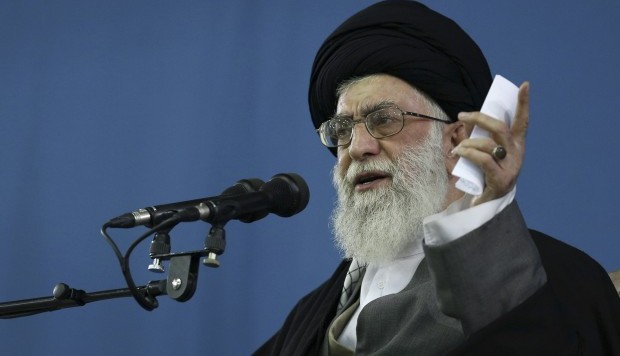As Iranians prepare to mark the 34th anniversary of the seizure of power by Ayatollah Khomeini a new style of moral self-flagellation is all the rage in revolutionary circles.
This is expressed in essays, poems, speeches and interviews making the rounds in the media and the blogosphere.
Leading the self-flagellation are Islamist and leftist intellectuals who played a role in The Islamic Revolution.
One repentant revolutionary suggests that had Iran not experienced that event it would now be a leading economic power with high living standards and ample social and cultural freedoms.
Another repentant revolutionary, this time a poet, has composed a qasida (ballad) lamenting the creation of the Islamic Republic as a national catastrophe. The average citizen might agree. After all, the Tehran leadership is offering a sad spectacle.
Last month, Supreme Guide Ali Khamenei warned regime grandees that if they caused tension by attacking each other he would regard them as traitors. Yet this is precisely what President Mahmoud Ahmadinejad and Majlis Speaker Ali Larijani did last week during an open session of the ersatz parliament. Ahmadinejad played the secretly recorded videotape of a meeting in which one of Larijani’s brothers promised a businessman to get him government contracts in exchange for a $20 million bribe (since then the taped video of the sting operation has been put on YouTube, presumably by Ahmadinejad).
Speaker Larijani retaliated by practically throwing Ahmadinejad out of the Majlis. Larijani’s elder brother, Sadeq, who is head of the Islamist judiciary, retaliated by having Sa’id Mortazavi, a shadowy figure close to Ahmadinejad, arrested on a charge of entrapping the younger Larijani.
Larijani’s brother-in-law Ali Motahhari, a member of the Majlis, went further and branded Ahmadinejad a traitor. The daily Kayhan, relaying the views of the “Supreme Guide”, echoed the sentiment by accusing Ahmadinejad of “treason”. Since Ahmadinejad’s two predecessors, Rafsanjani and Khatami, have also been accused of treason, this means that for a quarter of a century at least the Islamic Republic has been presided over by traitors.
The power struggle in Tehran is conducted in the style of the Mafia with the president secretly taping his opponents without referring their misdeeds to the police. Also in Mafia-style, the president’s opponents abduct and, in some cases, murder, people close to him as a means of ensuring his retreat or silence.
Ahmadinejad claims that the Larijani clan is acting as a crime syndicate using some organs of the state. The Larijanis counter by accusing Ahmadinejad of presiding over a shadowy organization engaged in plundering the national treasury.
Needless to say, it is difficult to verify the claims made by both sides.
However, one thing is certain: While rival factions are engaged in a zoological struggle for power, the country is looking increasingly like a rudderless ship adrift in stormy seas.
When all is said and done, the real issue is not whether the Larijani crime syndicate or the Ahmadinejad circle of treason should be in charge of the Islamic Republic. The real issue is whether the Islamic Republic, a hybrid monster created by a semi-literate mullah, can best reflect Iran’s hopes and aspirations in the 21st century.
You would not be surprised to know that my own answer is a resolute no. I have always believed that the Khomeinist revolution was a tragic mistake. However, now that it has happened it is part of history. Thus the current wave of self-flagellation would serve little purpose. Repentance might make former revolutionaries feel good in the same way sinners feel better after confession. That, however, would not address Iran’s present and future needs.
After three decades of direct experience of the Khomeinist system Iranians have arrived at a certain judgment of it. The final judgment, however, will be made by history.
We must not chain ourselves to the past, either as I-told-you-so counter-revolutionaries or as I-am-sorry agents of the revolution.
What matters now is the nation’s current situation with a leadership torn by Mafia-style squabbles and a political set-up designed to lead the country into impasse. The economy is in dire straits and the national currency in free fall. Many people, including former senior officials, are fleeing the country with Samsonites full of foreign currency. Every day over 1,000 people lose their jobs. At the same time, pawns are being propelled to fix another so-called presidential election. A wayward foreign policy is leading the nation into conflicts and possibly even war. In large chunks of the country there is a steady breakdown in law and order. Resources badly needed at home are squandered on propping up Syria’s doomed despot and hiring adventurers like Hassan Nasrallah in Lebanon and his Islamic Jihad counterparts in Gaza.
The interesting question is not whether the revolution was a mistake. Like other revolutions in history, the 1979 Iran revolution happened because the Shah’s regime could not offer an efficient mechanism of reform to provide the changes necessary.
The interesting question is whether or not the Khomeinist regime has also led itself into a closed circle. Its refusal to tolerate any opposition, including the loyal one led by people like Mousavi and Karroubi, and its failure to develop a credible national strategy while drunk on hubris amplify the disastrous effects of its incompetence.
Today, the question that repenting revolutionaries and others must ponder is whether or not Iran can get out of the current impasse without regime change.
